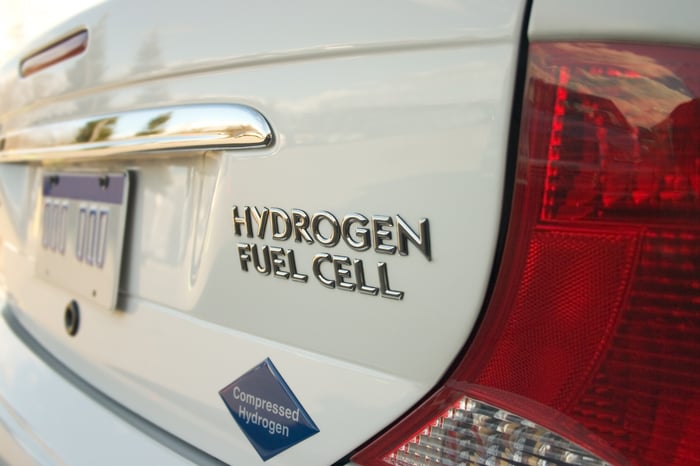Faster than a speeding bullet. More powerful than a locomotive. It's not Superman -- it's the stock market, which continues to power to all-time record highs following the coronavirus disease 2019 (COVID-19)-induced crash during the first quarter of 2020.
The big question is if the market is overheating. Considering there are so many COVID-19 and recessionary hurdles still to overcome, it's something that's definitely on the minds of Wall Street professionals.
Right now, there are three exceptionally popular stocks that are valued far and away higher than Wall Street's consensus price target for each company. Should this consensus price target prove accurate, these popular plays could all fall 40%, or more.

Image source: Getty Images.
Tesla Motors: Implied downside of 46%
It's perhaps no surprise that megacap highflier Tesla Motors (TSLA 12.06%) makes the list as one of Wall Street's perceived-to-be most-overvalued companies. Closing on Thursday, Jan. 7 at $816.04, Tesla has a consensus one-year target price of $438.83. That's an implied downside of 46%.
Tesla has clearly done something right to earn a nearly $774 billion market cap. It has first-mover advantages in the electric-vehicle (EV) space, and its battery technology provides superior range and power, relative to the competition. Though the company fell 450 EVs shy of CEO Elon Musk's delivery target for 2020, 499,550 deliveries is nothing to scoff at for an auto company that's been successfully built from the ground up.
However, a close to $774 billion market cap makes a lot of assumptions that simply haven't been proven true. This is a valuation that assumes Tesla remains the clear leader in U.S. EVs. Yet, it's ignoring the $27 billion investment General Motors announced for EVs and autonomous vehicles between 2020 and 2025, or the $11 billion Ford ponied up (pardon the pun) for EV research and development. Tesla's ability to remain No. 1 is suspect, at best, especially when you're dealing with companies that have deep pockets and storied brands.
Furthermore, the auto industry is plagued by low margins and high debt. Tesla has, thankfully, avoided burying itself in debt. The company also shored up its cash position via stock offerings in 2020. But this doesn't change the fact that selling autos is a low-margin, capital-intensive business.
What makes this problematic is that Tesla hasn't shown that it can generate a recurring profit solely from selling EVs. In recent quarters, the company has relied on selling hundreds of millions of dollars of renewable energy credits to other automakers to lift its adjusted profit. Without these credits, Tesla is still losing money from its operations.
Tesla's valuation isn't rooted in any common sense, and Wall Street's consensus price target reflects that.

Image source: Getty Images.
Cronos Group: Implied downside of 40%
Don't look now, but Canadian marijuana stocks are on fire. Shares of Ontario-based Cronos Group (CRON 0.41%) have catapulted higher by 76% since early October, and they've more than doubled off of the company's 52-week intraday low. But Wall Street isn't so excited. In fact, the professionals believe Cronos Group's stock has 40% downside.
The buzz (sorry, another bad pun) surrounding Cronos Group primarily has to do with the growing potential for Canadian weed stocks to enter the highly lucrative U.S. market. With the Georgia elections yielding favorable results for Democrats, it's now more likely that a pathway exists for nationwide legalization than a few months prior. Since Cronos Group has a boatload of cash and tobacco giant Altria Group as a vested partner, investors assume Cronos has a good shot at success throughout North America.
Yet, Wall Street's considerably lower consensus price target reflects very real concerns. In particular, Cronos Group has lagged its peers quite significantly in the production department. Cronos' Peace Naturals facility is only capable of 40,000 kilos of output annually. Worse yet, this space isn't even being fully utilized, with the company partitioning some of its cultivation area for derivative development/production. Long story short, Cronos' $3.1 billion market cap comes on the back of an estimated $33.9 million in full-year sales in 2020. Most billion-dollar pot stocks are generating sales figures like this in a few weeks.
The Cronos cash pile is also dwindling. After receiving a much-needed $1.8 billion equity investment from Altria in March 2019, Cronos has burned capital via operating losses, as well as spent $300 million (three-quarters of which was cash) to acquire the Lord Jones cannabidiol-based beauty line in the United States. Since March 2019, Cronos has burned through $500 million, and it's shown few signs of turning the corner to recurring profitability.
There are plenty of great North American cannabis stocks to choose from. Cronos isn't one of them.

Image source: Getty Images.
Plug Power: Implied downside of 40%
Hydrogen fuel cell solutions provider Plug Power (PLUG -6.95%) also has quite the disparity between its closing share price on Jan. 7 and Wall Street's consensus price targets (albeit the latter may soon be moving higher). This gap currently implies downside of up to 40% in Plug Power's shares.
The company has benefited from two key catalysts over the past six months. First, the victory by Democrats in key election races makes it more likely that renewable energy solutions will take precedence going forward over fossil fuels.
Perhaps more important, Plug Power and South Korea's SK Group announced a joint venture worth $1.5 billion last week to accelerate the expansion of hydrogen fuel-cell technology. Ideally, this would mean approximately 6 million fuel cell EVs and 1,200 refilling stations operable by 2040 in South Korea. SK Group took a 10% stake in Plug Power as part of the deal.
It's worth noting that Plug Power also has important associations with key retailers in the United States. Back in 2017, the company issued warrants to Amazon and Walmart that would allow the two to buy Plug's stock. Plug's GenDrive hydrogen fuel-cell technology is perfect for the forklifts these giants use in their warehouses and stores. The catch is, Amazon's and Walmart's warrants vest based on their fuel cell investments with Plug Power. It turned out to be a wise use of the dangling carrot trick, with both companies expected to spend big with Plug Power.
There are certainly catalysts aplenty with the SK Group deal now locked up. What's unclear is if Plug has the ability to generate a profit anytime soon. That'll likely determine whether or not it can hang onto these recent lofty gains.





